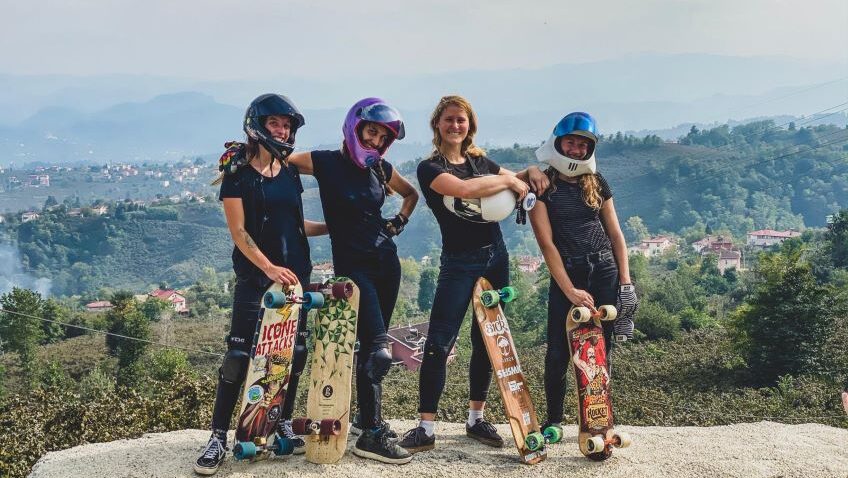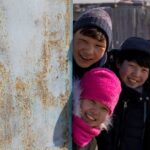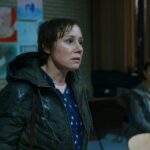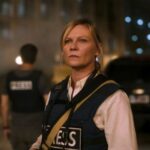Joyce Glasser reviews WoolfWomen: Now or Never (June 8, 2023) Cert 15, 76 mins. In Cinemas
Those of us who remember skateboarder/surfer/entrepreneur Stacy Peralta’s legendary Southern California skateboarding documentary Dogtown and Z-Boys (2001) will welcome WoolfWomen: Now or Never, a long-overdue, female-centric film about a different kind of skateboarding: downhill racing or longboarding. The 2018 no 2 World Championships ranking Jenny Schauerte, or Jenny Jungle, follows Peralta by becoming co-director, co-writer, co-editor (with Marchella de Angelis) of her own odyssey to skate an untried hill after a horrific injury. Anyone hoping for a new Dogtown and Z-Boys, however, will be disappointed by a film that is more of an uneventful travelogue in a camper van than skateboarding movie.
The first problem is the sound, with choral-type music drowning out the director ‘M’’s soft voice and the brief background of the protagonist, Jenny Jungle, née Jennifer Schauerte in Boston Mass, but raised in Bavaria. She was a snowboarder from a young age but only discovered downhill skateboarding when at art school in London in 2014 apparently doing her thesis on adrenaline.
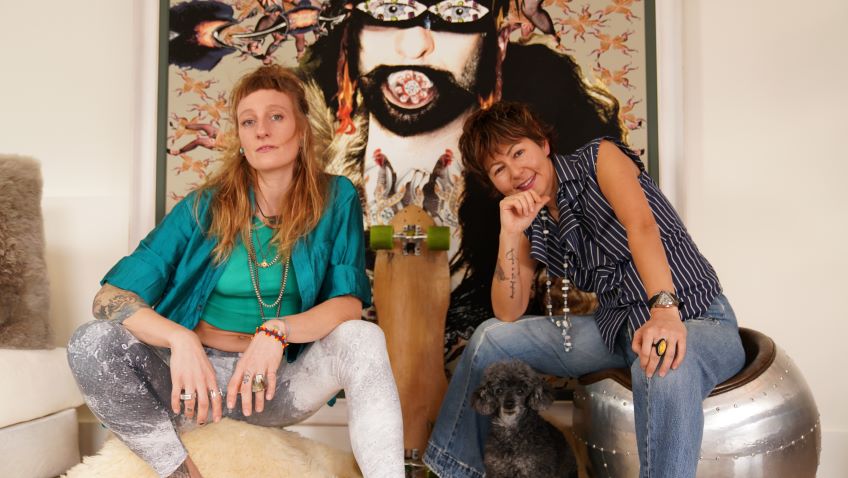
The sport enables Jenny, who is decorated with tattoos and a ring in her nose, to travel, and her Wolf Pack, so called as they are fearless and protect one another while retaining their independence, reflect this. If Peralta focused on the surfer/skateboarder culture in Santa Monica, (Dogtown), this film is about a loose-knit international group, and their culture seems to be their wanderlust.
We are briefly introduced to Anna Pixner from Austria, Lisa Peters from the Netherlands, Jasmijn ‘Jas’ Hanegraef from Belgium and Alexandra Gutierrez from Colombia. These longhaired, attractive girls of about the same age and build, are captioned only once, and then we are left to remember one from the other throughout the film. That is not much of a problem because the film is not about them, but about the trip – and Jenny.
It could be the focus of the film was necessarily changed when, in 2018, Jenny had a bad accident and spent two weeks in hospital having metal put in her leg and a third operation to correct mistakes from the first two. We also learn she was deeply affected by the sudden death of her beloved father who inspired her and to whom the film is dedicated. In any event, we see very little of Jenny skateboarding.
If you are hoping for some background and history on downhill skateboarding or context of skateboarding as a recognised sport, you won’t find it here. We know that it differs from “park” skateboarding in that the riders go downhill, like snow skiing, but on regular roads, reaching speeds of up to 100 kilometres per hour. Their only breaks are their bodies. They have special boards called longboards, which are wider to help with balance and the wheels are softer to help with bumps and allow a longer ride.
From the beginning, we hear about Jenny’s proposed odyssey: a 10,000 mile trek from London to Turkey to the famous Sumelia Monastery which was, curiously, under a well-known long term restoration when film crew and skateboarders got there, disappointed that they could not go in and show us inside. Apparently the girls would be the first to skateboard down it. It is the skating equivalent of the perfect wave in surfing.
But Jenny and her team are not longboarding there. That would have been something (and a very long film). They are travelling from London to the Pontic Alps in North Anatolia and then on to Trabzon in Jenny’s camper van with the film crew in a separate van behind. The first stop on the map is Romania, so apparently the trip from London to Berlin and down to Innsbruck and across to Bucharest was without interest.
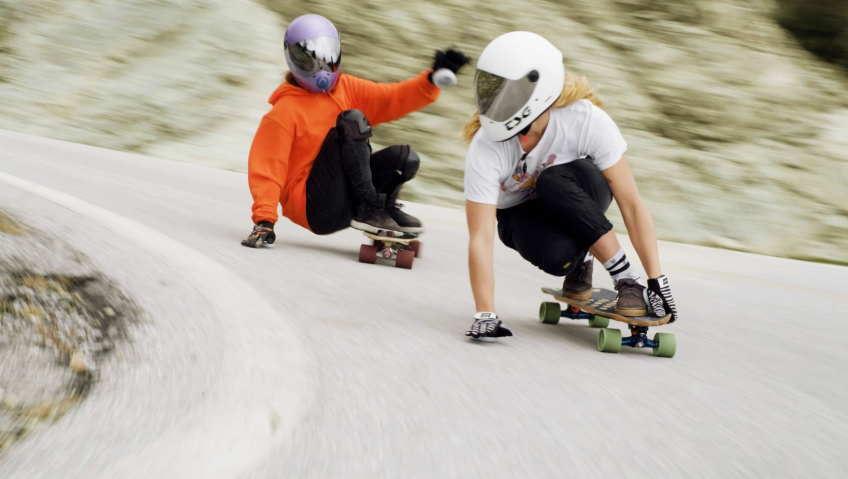
The rest of the journey is not particularly interesting either, although the girls stop to fly fish and hear a campfire song by singer/guitarist Karina Ramage. In Romania or Bulgaria, we watch the girls, looking fit in their swimsuits or underwear, row out to a lake on a makeshift raft. They swim balletically underwater like characters out of Avatar: The Way of Water, meaning someone had an underwater camera handy.
In Istanbul we meet Valeria Kechichian, an ecologist and gender-equality activist. As director of the non-profit Longboard Women United she ran a wonderful project in Malaysia empowering girls by teaching them to skateboard. She says, ‘when the boys see them, they change, too’. Now there’s an idea for a documentary….
For those without a head for heights, watching Jenny manoeuvre her van up the narrow, steep, winding path to the Monastery is the scariest part of the journey. The director-writer team try to make the downhill ride scary, too, by showing us shells from militia bullets, but we hear no more on that or the potential threat.
It would be great to report that the object of this long, petrol-guzzling journey to be the first to skateboard down the hill from the monastery, was the great climactic scene the audience is waiting for. But alas, it is not.
They start, not on the dirt trail, but on the paved motorway. Here, the Woolf Women circle around Jenny to protect her. Her muscles are weak and she hasn’t practised since the accident. Jenny says it’s now or never: she has to get back on a board. The paved motorway is steep, curvy and fast enough to be a challenge, particularly with cars coming up the dual carriageway. With their helmets, and filmed from the back, they are almost indistinguishable. But the whole downhill ride takes 3 mins of screen time. Ten thousand miles for three minutes!

